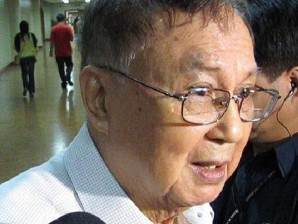MANILA, Philippines—Ombudsman Conchita Carpio-Morales’ use of information provided by the Anti-Money Laundering Council to prove the existence of 82 dollar accounts amounting to over $10 million allegedly owned by Chief Justice Renato Corona could delay the passage of a Senate bill strengthening the council’s powers.
Sponsors of an amendment that gives the AMLC ex parte powers allowing it to scrutinize a suspected money launderer’s deposits without having to inform him are gearing for intense debates with Sen. Joker Arroyo.
Arroyo had warned repeatedly in the past that Malacañang might abuse the Anti-Money Laundering Act and use it as an instrument to harass the President’s political enemies.
This is if the current procedure requiring the AMLC to first inform a depositor that his account would be examined is dropped, he explained.
Arroyo is convinced that Senate leaders realize the connection between his concerns and Morales’ disclosures on Corona’s dollar accounts last Monday.
“That’s why the leadership avoided putting the AMLA amendment bill on the calendar (Tuesday),” he said in an ambush interview.
Observers noted that Morales used information provided by the AMLC in discussing Corona’s dollar deposits.
In her testimony Monday, Morales said analysis of Corona’s 705 transactions from April 2003 to early this year revealed that the Chief Justice is keeping $12 million in untouched “fresh deposits” while circulating additional foreign currency in numerous branches of five banks all over Metro Manila.
“I don’t have a problem with the Ombudsman’s testimony. The problem here is with AMLC. Why did it give those information to her,” Arroyo said.
Under the law, banks are required to inform the AMLC of all depositors’ transactions including deposits, transfers and withdrawals involving P500,000 and above or its foreign equivalent.
Corona’s lawyers invoked the secrecy law involving foreign currency deposits when they asked the Supreme Court to issue a temporary restraining order barring the Senate sitting as impeachment court from scrutinizing his dollar accounts.
However, it is not clear whether the same law bars the AMLC from surrendering the information provided by banks to the Office of the Ombudsman that is now engaged in a “fact-finding” effort to establish the existence of Corona’s dollar accounts.
Sen. Teofisto Guingona III, one of the sponsors of the AMLA amendment bill, said he expects Arroyo to raise his concerns when the Senate discusses the measure on Wednesday morning.
Guingona maintained that the AMLC did not violate bank secrecy laws when it informed Morales of the dollar transactions entered into by Corona.
“You must remember, these are records already with AMLC. These are just files sitting in the AMLC offices. It’s not like (investigators) went to the banks and demanded these records. The reports made by the banks are required by law,” he explained.
Besides, Guingona said the statement of assets, liabilities and net worth (SALN) filed by Corona has a waiver indicating it is not exempt from scrutiny by the Office of the Ombudsman.
Senate majority leader Tito Sotto said other senators aside from Arroyo are also expected to raise more questions following Morales’ revelations in the impeachment trial.
“While we are already in the period of amendments, senators are still allowed to ask questions,” he said in an ambush interview.
Sotto said AMLC executive director Vicente Aquino would be present in the Senate gallery today to aid the bill sponsors in fielding these questions.
As it is, the Senate is under pressure to approve the bill amending the AMLA before the end of the month to avoid inclusion on the blacklist of the global-based Financial Action Task Force.
The FATF has threatened sanctions against the Philippines such as additional red tape in international bank transactions like OFW remittances if Congress fails to approve the measure by June.
